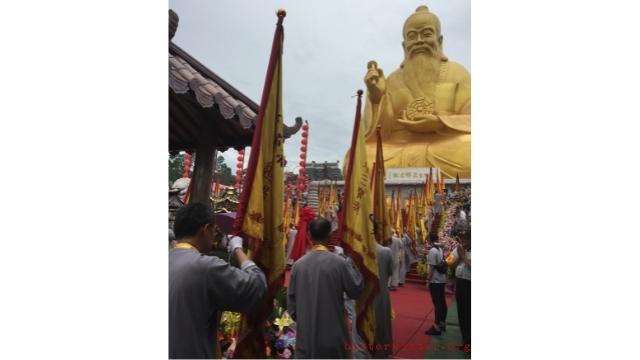The ancient sage Guiguzi is traditionally considered the first teacher to have operated a school of diplomacy, both for government officers and common citizen. His spirit lives in the citizen diplomacy of Tai Ji Men.
by Massimo Introvigne*
*A paper presented at the webinar “Tai Ji Men: Citizen Diplomacy for Peace and Justice,” co-organized by CESNUR and Human Rights Without Frontiers on April 24, 2022, United Nations International Day of Multilateralism and Diplomacy for Peace.

On June 8, 2018, I was in Taiwan for the annual CESNUR conference. Conference participants took a break from their sessions to attend the unveiling of a 25-meter-tall statue of Guiguzi (鬼谷子) in Nantou County. I mention this event on April 24, the International Day of Multilateralism and Diplomacy for Peace, because there are good chances that “diplomacy for peace” was invented by Guiguzi.
Guiguzi became of interest to me when I started studying one of Taiwan’s new religions, Weixin Shengjiao (唯心聖教), on which I have written and lectured extensively. It is a central tenet of Weixin Shengjiao that the legitimate successor of the mythical Three Chinese Ancestors was Guiguzi, identified with the Bodhisattva Wang Chan Lao Zu, and that he appeared to the founder of the movement, Grand Master Hun Yuan, mysteriously united with him, and gave to him several books of revelations.
Guiguzi, “the Sage of Ghost Valley,” is the name given to a treatise about peace and diplomacy that appeared in China towards the end of the Warring States period (453–221 BCE). The traditional narrative is that the book was authored by a sage whose name was indeed Guiguzi, who operated the first school of diplomacy in human history.

A shrine in the Shui Lian Cave in Yunmeng Mountain, Qi County, Henan, the place where the school is said to have been located was erected in the 19th century, and is still visited by pilgrims. I also went there, in June 2017—and took several pictures.

20th-century scholars contested the traditional narrative. As Michael Broschat stated in his 1985 PhD dissertation on Guiguzi, they noted that the earlier available information about the sage “is based on statements made first, as far as we know, about one thousand years after his supposed lifetime,” and claimed that a person called Guiguzi might never have existed. The book of course existed, but it might well have been a compilation of writings by different authors.
Recently, however, scholars came to adopt different views. For instance, University of Oklahoma historian Garret Olberding maintains that “in itself this lack of information [about Guiguzi] is insufficient ground to dismiss him as fiction.”
Like many other Chinese sages, Guiguzi was deified after his death and became a god of commerce, although in the new religion Weixin Shengjiao it clearly exceeded the role of a mere trade deity and became a main god.
Regardless of whether he was a single person or the collective name of a group, Guiguzi operated what is traditionally believed to be the first school of diplomacy in human history, where pupils slept in the huts and caves we may still see in Qi County.

What Guiguzi taught is known as bai he (捭闔), which is sometimes translated as “maneuvers” but is composed by two Chinese characters meaning “open” and “shut,” also interpreted as “speak” and “remain silent.” Indeed in the Guiguzi book diplomacy is taught as a continuous combination of yin and yang, firmness and flexibility, “captivate and capture” (fei qian, 飛 箝), “resist and reconcile” (wu he, 忤合).
Although the expression “citizen diplomacy” was coined in the late 20th century, in fact some 2,200 years before the word existed Guiguzi had already established the fundamental principle that diplomacy and promoting peace between the states is not a profession, but a skill acquired through self-cultivation.

This has remained a fundamental principle in the Sinosphere, and—well before the name existed—East Asian religious movements have practiced “citizen diplomacy” and promoted ambitious initiatives for peace.
This is certainly the case for Dr. Hong Tao-Tze, the leader of Tai Ji Men, and his dizi (disciples). While at the cultural and peace events promoted by Tai Ji Men one can met career diplomats, the world tours for peace and love that took Dr. Hong and Tai Ji Men to more than 100 different countries are one of the most massive exercises of citizen diplomacy in the world today. Tai Ji Men dizi are not professional diplomats, yet they play a diplomatic role through friendship and culture. They know that their effectiveness is rooted in self-cultivation—just as Guiguzi said so many centuries ago.
At the same time, Tai Ji Men dizi need the classical arts taught by Guiguzi and the principle of “resist and reconcile” to defend their human rights and fight for justice in Taiwan. For many years, the two processes have been developed together within Tai Ji Men: promoting love and peace throughout the world, and at the same time protest against persecution and human rights violations in Taiwan. Citizen diplomacy for peace, and citizen diplomacy for justice, which are really not separated.
We all have a lot to learn from Tai Ji Men dizi. The reference to Guiguzi shows that perhaps they are so effective in what they do because they epitomize a millennia-old Chinese tradition, and a gift Chinese culture gave to the world.
Source: Bitter Winter

